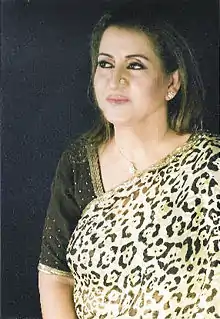Munni Begum
Nadira Begum (Urdu: نادرہ بیگم), better known by her pseudonym title, Munni Begum (Urdu: مُنّی بیگم) is a Pakistani vocalist and ghazal singer.[1][2][3]
Munni Begum منی بیگم | |
|---|---|
 | |
| Background information | |
| Birth name | Nadira Begum |
| Born | 1959 Murshidabad, West Bengal British India |
| Origin | Pakistan |
| Genres | Ghazal |
| Occupation(s) | Ghazal singer |
| Years active | 1955 – present |
Early life
Munni Begum was born Nadira Begum in Murshidabad, West Bengal, British India in 1959.[3] The third child of seven children. She first started taking music lessons from the famous singer Ustad Khwaja Ghulam Mustafa Warsi. It was this music teacher who gave her this professional name due to her small size and young age. Subsequently, she studied in the school of music for three years, and thereafter, she launched her career.[4][3]
Her parents migrated from India to East Pakistan in the early 1950s. East Pakistan later became independent Bangladesh. She studied in BAF Shaheen School, Dhaka; however, she moved to Karachi, West Pakistan before graduating from high school, due to Bangladesh Liberation War of 1971.[4]
Career
Munni Begum began her career as a singer in Karachi, Pakistan in the 1970s. She released her first album of ghazals in 1976.[4] Then she sang many more hit ghazals and thus became a renowned ghazal singer of Pakistan.[5] In her news media interviews, she always was quick-witted and bold. Even though Urdu language was not her mother tongue, she showed a remarkable talent for choosing ghazals with simple language. This was very effective and became one of the reasons of her popularity among common people. The other reasons for her popularity were that she had a voice characterized by its clarity and strength.[4] In the 1980s, Munni Begum's rise coincided with the rapid growth of a then new technology, the cassette tape. Cassette tape prices were cheap compared to the old technology of vinyl records. On top of that, Munni Begum had a rich voice with many shades. She also was a good harmonium player.[4]
Personal life
Munni Begum was married in the 1980s which resulted in a divorce in 1998. She has two daughters, Muniba Hasnain and Minara Umer, and one son Syed Muhammad Asad Ali. As of 2016, she lives in Chicago, United States and does not perform regularly.[4]
Notable ghazals
As for Munni Begum's hit ghazals, the list is very long. Some of these are:
- Lazzat-e-Ghum Badhaa Dijeay[4][2]
- Jhoom Barabar Jhoom Sharabi[4]
- Har Qadam Zehmatein...
- Tumhare Sheher Ka Mausam Bada Suhana Lage (lyrics by poet: Ahmad Faraz)[2]
- Ek Bar Muskura Do[6][2]
- Awaargi Mein Had Se Guzar Jaana Chahiye[4]
- Chahat MaeN Kya Dunya Dari, Ishq MaeN Kaisi Majboori
- Bewafa Se Bhi Pyar Hota Hai
- Bhoolne Wale Se Koi Kehde
- Dil Ko Hale Karar Mein Dekha
- Kisi kay Gham May Waqar Khona
- Idhar Zindagi Ka Janaza Uthey Ga (lyrics by poet: Tabish Dehlvi)[4][1]
- Bhujhi Hoi Shama Ka Dhuaan Hun
- Mareez-e-Mohabbat Unhi Ka Fasana[2]
- Laa Pilaade Saaqiya[4][1]
- Yeh Hai Maikhana Yahan Rind Hain[1]
Discography
- Munni Begum Khoobsurat Ghazlein Vol 1
- Awargi Vol-28
- Meri Pasand Vol. 1
- Meri Pasand Vol. 2
- Masti Mein Surahi Jhoomti Hai Vol. 1
- Masti Mein Surahi Jhoomti Hai Vol. 2
- An Evening With Munni Begum
- New Ghazals Vol. 26
- Munni Begum Vol-21
- Munni Begum Vol-20
- Sham-E-Ghazal
- Meri Pasand
- Munni Begum
- Munni Begum In Concert Vol. 4
- Munni Begum In Concert Vol. 3
- Munni Begum In Concert Vol. 2
- Munni Begum In Concert Vol. 1
Awards and recognition
- Pride of Performance Award (2008) by the Governor of Sindh on behalf of the President of Pakistan.[2][5]
References
- "Hit Songs of Munni Begum". Pakistan Television Corporation website. Archived from the original on September 7, 2009. Retrieved June 30, 2020.
- "Munni Begum puts on enthralling performance at Rawalpindi Arts Council (RAC)". Dawn (newspaper). April 23, 2016. Retrieved June 30, 2020.
- Sheikh, M. A. (April 26, 2012). Who's Who: Music in Pakistan (page 181). ISBN 978-1-4691-9159-1. Retrieved June 30, 2020.
- Nate Rabe (July 19, 2015). "Munni Begum, the Bengali refugee who won over Pakistan with her Urdu ghazals". Retrieved June 30, 2020.
- "Melodious treat: Munni Begum's ghazals captivate audience". The Express Tribune (newspaper). May 28, 2015. Retrieved July 27, 2016.
- "World Music Day: Food for the soul". Dawn (newspaper). June 21, 2009. Retrieved June 30, 2020.
